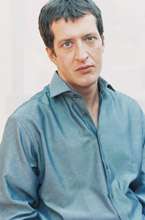|
Back
All In Adès Work New York
Carnegie Hall
03/27/2010 -
Leos Janácek: On the Overgrown Path, Book II
Richard Wagner: Isolde's ‘Liebestod’ from Tristan und Isolde (transcription by Franz Liszt)
Serge Prokofiev: Sarcasms, Op. 17
Franz Schubert: Allegretto in C Minor, D. 915
Thomas Adès: Concert Paraphrase on “Powder Her Face” (NY Premiere)
Ludwig van Beethoven: Bagatelles, Op. 126
Thomas Adès (pianist)

T. Adès (© EMI Classics)
For his third program in New York this month, Thomas Adès, the 40-year-old one-time wunderkind of piano and composition, played a solo recital which was personal, idiosyncratic and faintly disappointing. Not that Mr. Adès is anything but meticulous and clever. He is a brilliant pianist when necessary (especially in his own work). He chose an unusual program with different moods but a lack of depth.
That, in fact, may have been an error. All the works except his own were short or had very short movements. They were each moody and surprising, yet strangely unemotional. Even his own work, a Liszt-style improvisation on an opera which I don’t believe has been performed yet in New York, the sensations were flimsy but clever, as if Noel Coward taken advanced counterpoint classes.
The asset was that in a Carnegie Hall which was far from full, one felt that Mr. Adès was choosing music for a salon rather than an auditorium. And for intimate spaces, he did succeed.
Like the movements of a Bartók quartet, Mr. Adès selected a program where each piece reflected another. Lizst’s improvisatory transcription of Wagner’s Liebstod was reflected by Mr. Adès “concert paraphrase” of his own opera. Prokofiev’s Sarcasms were probably composed from his own famed notebooks of themes, while Beethoven’s Opus 126 Bagatelles were certainly taken from his own over the years. And certainly the opening work, Leos Janácek’s second book of On an Overgrown Path, while seeming improvisatory, was carefully constructed.
That opening, in fact, promised much, since Mr. Adès whispered the four movements on the piano. At times Janácek promises much in these lulling works, but at times they are like the Emperor’s new clothes, not quite delivering. Mr. Adès wanted them to sound mysterious, and his pedaling gave the resonance of a mantra.
While the enigmatic opening promised spacious vistas to come, the miniatures went on through the night. The Prokofiev Sarcasms were electrifying miniatures. Adès played them as written: aggressive, ironic, thundering. Like Mr. Adès, Prokofiev was quite the enfant terrible, and these early works gave all the elements of his future work.
Could Adès own early creations be as clever? Powder Her Face, his first opera, was oh so British in theme–the life of a decadent 20th Century aristocrat and her oh so evil sexual intentions. The “paraphrases” were brilliant and flimsy at the same time.
They began and ended with a tango, with a second paraphrase on the line “Is Daddy Squiffy?” Okay, I had to call a London friend for the definition, so didn’t notice that the music was supposed to be “drunk”. The music did glisten, it sparkled, it showed what a terrific performer Mr. Adès was. But no, he was not the Wagner which Liszt had paraphrased before.
The Beethoven Bagatelles are wonderful to play, but here they seemed less than charged. Outside of the violent measures, Mr. Adès glided through them, and let the lovely moments shine by themselves.
Two other works had that same grace. The Schubert Allegretto was a study in rocking movement, played with utmost delicacy. Mr. Adès’s first encore was Liszt’s first Valse oubliée. For both pieces, as for much of the program, he showed love, devotion, technique and a modish weariness.
Harry Rolnick
|